Saint Mary Magdalen de'Pazzi was born in Florence and joined the Carmelites when she was nineteen. She practiced great mortification for the salvation of sinners; her constant exclamation was, "To suffer, not to die!" With apostolic zeal, she urged the renewal of the entire ecclesiastical community.
Source: Daily Roman Missal, Edited by Rev. James Socías, Midwest Theological Forum, Chicago, Illinois ©2003
Collect:
O God, lover of virginity,
who adorned with heavenly gifts
the Virgin Saint Mary Magdalene de'Pazzi,
setting her on fire with your love,
grant, we pray, that we, who honor her today,
may imitate her example of purity and love.
Through our Lord Jesus Christ, your Son,
who lives and reigns with you in the unity of the Holy Spirit,
one God, for ever and ever. +Amen.
First Reading: 1 Corinthians 7:25-35
Now concerning the unmarried, I have no command of the Lord, but I give my opinion as one who by the Lord's mercy is trustworthy. I think that in view of the present distress it is well for a person to remain as he is. Are you bound to a wife? Do not seek to be free. Are you free from a wife? Do not seek marriage. But if you marry, you do not sin, and if a girl marries she does not sin. Yet those who marry will have worldly troubles, and I would spare you that. I mean, brethren, the appointed time has grown very short; from now on, let those who have wives live as though they had none, and those who mourn as though they were not mourning, and those who rejoice as though they were not rejoicing, and those who buy as though they had no goods, and those who deal with the world as though they had no dealings with it. For the form of this world is passing away.
I want you to be free from anxieties. The unmarried man is anxious about the affairs of the Lord, how to please the Lord; but the married man is anxious about worldly affairs, how to please his wife, and his interests are divided. And the unmarried woman or girl is anxious about the affairs of the Lord, how to be holy in body and spirit; but the married woman is anxious about worldly affairs, how to please her husband. I say this for your own benefit, not to lay any restraint upon you, but to promote good order and to secure your undivided devotion to the Lord.
Gospel Reading: Mark 3:31-35
Jesus' mother and His brethren came; and standing outside they sent to Him and called Him. And a crowd was sitting about Him; and they said to Him, "Your mother and Your brethren are outside, asking for You." And He replied, "Who are My mother and My brethren?" And looking around on those who sat about Him, He said, "Here are My mother and My brethren! Whoever does the will of God is My brother, and sister, and mother."
LETTER OF HIS HOLINESS BENEDICT XVI TO THE ARCHBISHOP OF FLORENCE ON THE OCCASION OF THE FOURTH CENTENARY OF THE DEATH OF ST. MARY MAGDALENE DE’ PAZZI
To His Eminence
Cardinal Ennio Antonelli
Archbishop of Florence
On the occasion of the Fourth Centenary of the death of St Mary Magdalene de' Pazzi, I am pleased to unite myself to the beloved Florentine Church who wishes to remember her illustrious daughter, particularly dear as a symbolic figure of a living love that recalls the essential mystical dimension of every Christian life.
While with affection I greet you, Your Eminence, and the entire diocesan community, I give thanks to God for the gift of this Saint, which every generation rediscovers as uniquely close by knowing how to communicate an ardent love for Christ and the Church.
Born in Florence on 2 April 1566 and baptized at the "beautiful St John" font with the name Caterina, St Mary Magdalene de' Pazzi showed a particular sensitivity to the supernatural from childhood and was attracted by intimate colloquy with God.
As was the custom for children of noble families, her education was entrusted to the Dames of Malta, in whose monastery she received her First Holy Communion on 25 March 1576, and just some days later she consigned herself to the Lord for ever with a promise of virginity.
Returning to her family, she deepened her prayer life with the help of the Jesuit Fathers, who used to come to the palace. She cleverly did not allow herself to be conditioned by the worldly demands of an environment that, although Christian, was not sufficient to satisfy her desire to become more similar to her crucified Spouse.
In this context she reached the decision to leave the world and enter the Carmel of St Mary of the Angels at Borgo San Frediano, where on 30 January 1583 she received the Carmelite habit and the name of Sr Mary Magdalene.
In March of 1584, she fell gravely ill and asked to be able to make her profession prior to the time, and on 27 May, Feast of the Trinity, she was carried into the choir on her pallet, where she pronounced before the Lord her vows of chastity, poverty and obedience for ever.
From this moment an intense mystical season began which was also the source of the Saint's great ecstatic fame. The Carmelites of St Mary of the Angels have five manuscripts in which are recorded the extraordinary experiences of their young Sister.
"The Forty Days" of the summer of 1584 are followed by "The Colloquies" of the first half of the following year. The apex of the mystical knowledge that God granted of himself to Sr Mary Magdalene is found in "Revelations and Intelligences", eight days of splendid ecstacies from the vigil of Pentecost to the Feastday of the Trinity in 1585. This was an intense experience that made her able at only 19 years of age to span the whole mystery of salvation, from the Incarnation of the Word in the womb of Mary to the descent of the Holy Spirit on Pentecost.
Five long years of interior purification followed - Mary Magdalene de' Pazzi speaks of it in the book of "The Probation" - in which her Spouse, the Word, takes away the sentiment of grace and leaves her like Daniel in the lions' den, amid many trials and great temptations.
This is the context in which her ardent commitment to renew the Church takes place, after which, in the summer of 1586, splendours of light from on high came to show her the true state of the post-Tridentine era.
Like Catherine of Siena, she felt "forced" to write some letters of entreaty to the Pope, Curial Cardinals, her Archbishop and other ecclesial personages, for a decisive commitment to "The Renovation of the Church", as the title of the manuscript that contains them says. It consists of 12 letters dictated in ecstasy, perhaps never sent, but which remain as a testimony of her passion for the Sponsa Verbi.
With Pentecost of 1590 her difficult trial ended. She promised to dedicate herself with all her energy to the service of the community and in particular to the formation of novices. Sr Mary Magdalene had the gift to live communion with God in an ever more interior form, so as to become a reference point for the whole community who still today continue to consider her "mother".
The purified love that pulsated in her heart opened her to desire full conformity with Christ, her Spouse, even to sharing with him the "naked suffering" of the Cross. Her last three years of life were a true Calvary of suffering for her. Consumption began to clearly manifest itself: Sr Mary Magdalene was obliged to withdraw little by little from community life to immerse herself ever more in "naked suffering for love of God".
She was oppressed by atrocious physical and spiritual pain which lasted until her death on Friday, 25 May 1607. She passed away at 3 p.m., while an unusual joy pervaded the entire monastery.
Within 20 years of her death the Florentine Pontiff Urban VIII had already proclaimed her Blessed. Pope Clement IX inscribed her in the Roll of Saints on 28 April 1669.
Her body has remained incorrupt and is the destination of constant pilgrimages. The monastery where the Saint lived is today the seat of the Archiepiscopal Seminary of Florence, which venerates her as their Patron, and the cell where she died has become a chapel in whose silence one can still feel her presence.
St Mary Magdalene de' Pazzi continues to be an inspiring spiritual figure for the Carmelites Nuns of the Ancient Observance. They see in her the "Sister" who has travelled the entire way of transforming union with God and who finds in Mary the "star" of the way to perfection.
This great Saint has for everyone the gift of being a spiritual teacher, particularly for priests, to whom she always nourished a true passion.
I truly hope that the present jubilee celebrations commemorating her death will contribute to making this luminous figure ever better known, who manifests to all the dignity and beauty of the Christian vocation. As, while she was alive, grasping the bells she urged her Sisters with the cry: "Come and love Love!", may the great Mystic, from Florence, from her Seminary, from the Carmelite monasteries that draw their inspiration from her, still make her voice heard in all the Church, spreading to every human creature the proclamation to love God.
With this wish, I entrust you, Venerable Brother, and the Florentine Church to the heavenly protection of St Mary Magdalene de' Pazzi and heartily impart to all a special Apostolic Blessing.
From the Vatican, 29 April 2007
BENEDICTUS PP. XVI
© Copyright 2007 - Libreria Editrice Vaticana





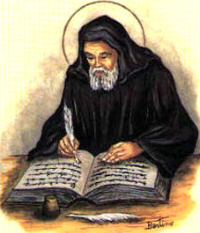
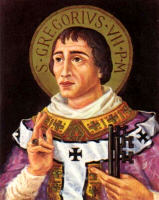 Gregory VII — his name had been Hildebrand before becoming Pope — was born about the year 1020. For two years he was a Benedictine monk of Cluny (1047-1049), then he became a cardinal, and finally, in 1073, Pope. A strong character with a remarkable personality, he easily takes a place with the greatest popes in the Church's history.
Gregory VII — his name had been Hildebrand before becoming Pope — was born about the year 1020. For two years he was a Benedictine monk of Cluny (1047-1049), then he became a cardinal, and finally, in 1073, Pope. A strong character with a remarkable personality, he easily takes a place with the greatest popes in the Church's history. 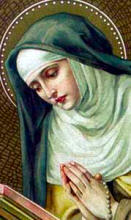 Mary Magdalen of Pazzi, a highly gifted mystic, had made a vow of chastity at the age of ten. She entered the convent of the Discalced Carmelite nuns in Florence, because the practice of receiving holy Communion almost daily was observed there. For five years her only food was bread and water. She practiced the most austere penances and for long periods endured complete spiritual aridity. Her favorite phrase was: "Suffer, not die!" Her body has remained incorrupt to the present day; it is preserved in a glass coffin in the church of the Carmelite nuns at Florence.
Mary Magdalen of Pazzi, a highly gifted mystic, had made a vow of chastity at the age of ten. She entered the convent of the Discalced Carmelite nuns in Florence, because the practice of receiving holy Communion almost daily was observed there. For five years her only food was bread and water. She practiced the most austere penances and for long periods endured complete spiritual aridity. Her favorite phrase was: "Suffer, not die!" Her body has remained incorrupt to the present day; it is preserved in a glass coffin in the church of the Carmelite nuns at Florence. 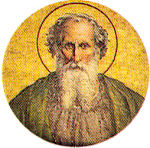 St. Urban, who succeeded Pope St. Callistus (cf. October 14), reigned from 222 to 230. During his pontificate the Church enjoyed peace, because Emperor Alexander Severus forbade the persecution laws to be enforced. Of special interest is a decree ascribed to Pope Urban regarding use made of the gifts offered at Mass. "The gifts of the faithful that are offered to the Lord can only be used for ecclesiastical purposes, for the common good of the Christian community, and for the poor; for they are the consecrated gifts of the faithful, the atonement offering of sinners, and the patrimony of the needy" (Breviary).
St. Urban, who succeeded Pope St. Callistus (cf. October 14), reigned from 222 to 230. During his pontificate the Church enjoyed peace, because Emperor Alexander Severus forbade the persecution laws to be enforced. Of special interest is a decree ascribed to Pope Urban regarding use made of the gifts offered at Mass. "The gifts of the faithful that are offered to the Lord can only be used for ecclesiastical purposes, for the common good of the Christian community, and for the poor; for they are the consecrated gifts of the faithful, the atonement offering of sinners, and the patrimony of the needy" (Breviary). 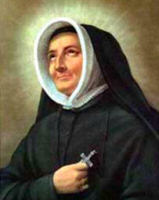 Under the guidance of her brother Madeleine Sophie Barat became at an early age proficient in Latin, Greek, Spanish and Italian. The brother, nine years her senior, was a stern disciplinarian. If her work was bad, she was punished — sometimes by a box on the ears - but if she did well, no word of praise was uttered. She was never allowed to relax from this discipline — even walks were forbidden unless they were strictly necessary for exercise; and when, in a moment of mistaken tenderness, she gave her brother a present, he threw it on the fire. She was ten when the French Revolution occurred in 1789. Afterwards, and still under the influence of her brother, she met Father Varin who desired to found a female counterpart of the Jesuits which should do for girls' education what they did for boys' education. On November 21st, 1800, Madeleine with three companions dedicated herself to the Sacred Heart and so the New Congregation was begun. From the first house at Amiens it was to spread in the lifetime of its foundress all over Europe and to Africa and America, and its boarding schools have become famous.
Under the guidance of her brother Madeleine Sophie Barat became at an early age proficient in Latin, Greek, Spanish and Italian. The brother, nine years her senior, was a stern disciplinarian. If her work was bad, she was punished — sometimes by a box on the ears - but if she did well, no word of praise was uttered. She was never allowed to relax from this discipline — even walks were forbidden unless they were strictly necessary for exercise; and when, in a moment of mistaken tenderness, she gave her brother a present, he threw it on the fire. She was ten when the French Revolution occurred in 1789. Afterwards, and still under the influence of her brother, she met Father Varin who desired to found a female counterpart of the Jesuits which should do for girls' education what they did for boys' education. On November 21st, 1800, Madeleine with three companions dedicated herself to the Sacred Heart and so the New Congregation was begun. From the first house at Amiens it was to spread in the lifetime of its foundress all over Europe and to Africa and America, and its boarding schools have become famous. 

